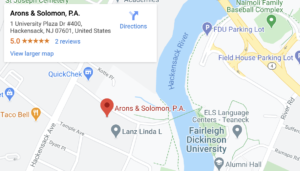Domestic Violence FAQ

Domestic violence takes many forms, including physical, verbal, emotional, and sexual abuse. It can be incredibly difficult to escape an abusive spouse. However, you can get help to leave an abusive spouse. New Jersey laws protect victims of domestic violence.
Our Bergen County divorce lawyers answer frequently asked questions about domestic violence. Continue reading to learn how you can obtain a restraining order and other relief to protect you from your abuser.
Table of Contents
What Is Considered Domestic Violence in New Jersey?

Domestic violence is a crime against a person protected by the Prevention of Domestic Violence Act (PDVA) of 1991.
Crimes that can result in a domestic violence charge include:
- Assault
- Homicide
- Kidnapping
- Criminal sexual contact
- Stalking
- Harassment
- False imprisonment
- Burglary
- Lewdness
- Robbery
- Cyber harassment
- Contempt of a domestic violence order
Domestic violence also includes any crime that involves the risk of serious bodily injury or death. The parties must share a specific relationship for the crime to qualify as domestic violence.
Who Is Protected by the Prevention of Domestic Violence Acts?
The relationship between the parties establishes whether a person is protected under the PDVA. A protected person includes anyone over the age of 18 years or an emancipated minor who is the victim of domestic violence by a:
- Spouse or former spouse
- Someone who lives in the same home now or in the past, or has a close relationship with the victim
- A person with whom they share a child or is pregnant with their child
- A person with whom they had a dating relationship
Gender is not a factor if the relationship between the parties falls under the protected persons in the PDVA. A minor is emancipated for the purposes of the PDVA if they have been married, are pregnant or have a child, have entered the military, or have been declared emancipated by an administrative agency or a court.
The consequences of domestic violence can be severe. The abuser can face criminal charges, a restraining order, and a personal injury claim.
How Do I Get a Temporary Restraining Order for Domestic Violence?
A temporary restraining order (TRO) is a protective order issued by the court. The provisions in the TRO are intended to protect the victim from further abuse. The court issues TROs quickly when a judge finds evidence of domestic violence. The abuser does not have to be notified before the TRO is granted, but they must be served with a TRO.
Examples of provisions in temporary restraining orders for domestic violence include:
- The abuser is prohibited from engaging in future acts of domestic violence.
- The victim is granted exclusive use of the home the parties share.
- The abuser is prohibited from returning to the scene where the domestic violence occurred.
- The abuser is required to surrender all firearms and other weapons.
- The abuser is prohibited from being within a certain distance of the victim or going to the victim’s school or place of employment.
- The abuser is prohibited from communicating with the victim and the victim’s family members by any means, including having someone contact the victim on the abuser’s behalf.
- The victim is given temporary custody of the children, and the abuser is ordered to pay child support.
- The abuser is required to reimburse the victim for medical expenses incurred by the victim because of the domestic violence.
A temporary restraining order remains in effect until the court holds a final hearing. The court usually schedules a final hearing within ten days of issuing the TRO.
The abuser is notified of the hearing and can attend to offer evidence and testimony before the court issues a final restraining order. If the court issues a final restraining order, the judge may leave the terms the same as those in the TRO, or the judge may modify the terms. Final restraining orders do not expire and are enforceable in every state.
How Do I Obtain a Temporary Restraining Order in Bergen County, NJ?
You can contact the Family Division of the Bergen County Superior Court Monday through Friday to request a restraining order. On weekends, evenings, and after 3:30 p.m. Monday through Friday, you can contact the state or local police department in your area to request a TRO from the Municipal Court. You may file for a temporary restraining order where you live, the abuser lives, the domestic violence occurred, or you are temporarily staying.
Are Criminal Charges Filed for Domestic Violence in New Jersey?
In addition to requesting a restraining order, you can file a criminal complaint. Domestic violence criminal complaints allege that the abuser has violated one or more laws. The case is handled in the criminal courts. If the abuser is found guilty, they will face criminal penalties based on the charges.
What Happens if I Am Facing False Allegations of Domestic Violence?
Unfortunately, you could be accused of domestic violence when you are innocent. A person may falsely accuse you of domestic violence because they are angry, or they want an upper hand in a family court matter. Because you could face criminal charges and collateral consequences of a temporary restraining order, it is crucial to contact an attorney as soon as possible to discuss a defense to the allegations.
Can I File a Personal Injury Claim for Domestic Violence?
In addition to obtaining a TRO and filing a criminal complaint, a victim may also file a personal injury claim against the abuser. The victim may be entitled to damages, such as medical expenses, lost wages, pain, and suffering.
What Happens if Someone Violates a Restraining Order for Domestic Violence?
Even though a civil court issues a restraining order, violating a TRO or final restraining order can result in criminal charges. The police can arrest the abuser if they have probable cause to believe they violated the restraining order.
Violating a restraining order is a felony. The potential sentence for a conviction is up to 18 months in prison and a maximum fine of $10,000. You may also be charged with a disorderly persons offense. If convicted, the sentence for a disorderly persons offense is up to six months in jail and a maximum fine of $1,000.
A second violation of a restraining order results in a mandatory jail sentence. You must serve at least 30 days in jail without exception.
Get Help with a Domestic Violence Case in Bergen County, NJ
Our Bergen County domestic violence lawyers at Arons & Solomon Divorce Lawyers understand the urgency of a domestic violence case. Contact our office at (201) 487-1199 for a free consultation to discuss your legal options to protect your rights and best interests.


